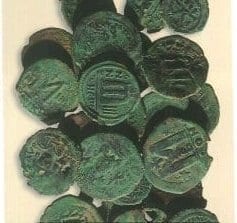
Horvat ‘Aqav – the Byzantine Period
The excavations in Horvat ‘Aqav revealed a farm house, with an open courtyard at its centre; in its south-east sector are corrals and storehouses, and on the north-west side are residential quarters and a wine press. The findings include rings, shards of clay utensils, glass, metal and stone. The farm is dated to the 5th and 6th centuries CE, and its abandonment is dated to the mid-7th century.
This period is called the Byzantine Period. In 324 CE Constantine the Great took over the crumbling Roman Empire as the sole ruler of Byzantium and declared Christianity the official religion of the empire. Many churches and monasteries were built throughout the Land of Israel and became pilgrimage sites for crusaders and monks. The end of the period was marked by the Arab conquest of the Land of Israel in 638 CE.
